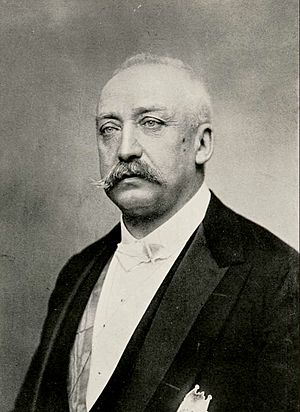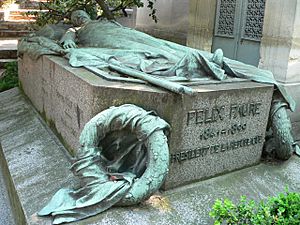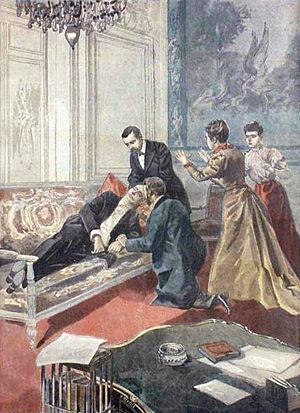Félix Faure facts for kids
Quick facts for kids
Félix Faure
|
|
|---|---|

Photograph by Nadar, c. 1895-99
|
|
| President of France | |
| In office 17 January 1895 – 16 February 1899 |
|
| Prime Minister | Charles Dupuy Alexandre Ribot Léon Bourgeois Jules Méline Henri Brisson |
| Preceded by | Jean Casimir-Perier |
| Succeeded by | Émile Loubet |
| Personal details | |
| Born |
Félix François Faure
30 January 1841 10th arrondissement of Paris, France |
| Died | 16 February 1899 (aged 58) Élysée Palace, Paris, France |
| Cause of death | Stroke |
| Resting place | Père Lachaise Cemetery, Paris |
| Political party | Moderate Republicans |
Félix François Faure (born 30 January 1841 – died 16 February 1899) was the President of France from 1895 until his death in 1899. He was born in Paris and worked as a tanner when he was younger.
Faure became a member of the French parliament, called the Chamber of Deputies, in 1881. He became well-known in French politics. During his time as president, France's relationship with Russia became much stronger.
A famous writer named Émile Zola wrote an open letter to Faure in 1898. This letter, called J'Accuse…!, was about the Dreyfus affair, a big political scandal in France. Faure's funeral was held at Notre-Dame Cathedral in Paris. During the funeral, there was an attempt to overthrow the government. This was led by a French nationalist poet named Paul Déroulède.
Contents
Félix Faure's Early Life and Career
Félix François Faure was born in Paris. His father, Jean-Marie Faure, made small furniture pieces. His mother was Rose Cuissard.
Faure started his career as a tanner and a merchant in Le Havre. He became quite wealthy from his businesses. On 21 August 1881, he was elected to the National Assembly. He joined the Left political group and was very interested in topics like economics, railways, and the navy.
In November 1882, he became an under-secretary for the colonies in Jules Ferry's government. He kept this job until 1885. He held the same position again in 1888. In 1893, he became the vice-president of the Chamber of Deputies.
Becoming President
In 1894, Faure became the Minister of Marine (in charge of the navy). This was part of Charles Dupuy's government.
The next year, in January 1895, he was unexpectedly chosen as President of the Republic. This happened after President Casimir-Perier resigned. Many moderate politicians wanted to stop another candidate, Henri Brisson, from becoming president. They needed someone who could unite everyone, and Faure was the perfect choice because he didn't upset anyone.
In 1895, he allowed some political exiles to return to France.
Key Events as President
In 1898, France was the biggest car manufacturer in the world. President Faure, however, was not very impressed. He spoke at what is now known as the first Paris Motor Show. He told the car industry leaders, "Your cars are very ugly and they smell very bad!"
Faure was good at official events. He hosted the Tsar (the emperor of Russia) in Paris in 1896. In 1897, he visited the Tsar in Russia. After this meeting, the Franco-Russian Alliance was officially announced again. This alliance was very important for France.
The end of Faure's presidency was dominated by the Dreyfus affair. This was a major political scandal involving a Jewish army officer who was wrongly accused of treason. Faure believed the case was closed and should not be reopened. This made many intellectuals and politicians, like Émile Zola and Georges Clemenceau, criticize him.
Freemasonry
Félix Faure joined a Freemason lodge called "L'aménité" in Le Havre on 25 October 1865.
Death
In 1897, Faure met Marguerite Steinheil. Félix Faure died on 16 February 1899, at the age of 58, from a Stroke.
After his death, some people made jokes about him. For example, Georges Clemenceau, a politician and newspaper editor, made a famous pun about Faure. Some parts of Faure's private journals, which discussed French policy, were also published in the Paris newspapers after he died.
See also
 In Spanish: Félix Faure para niños
In Spanish: Félix Faure para niños
- Félix Faure (Paris Métro), a station on line 8 of the Paris Métro
- Si-Mustapha, a town in Algeria formerly named Félix-Faure
Images for kids
 | Jackie Robinson |
 | Jack Johnson |
 | Althea Gibson |
 | Arthur Ashe |
 | Muhammad Ali |





